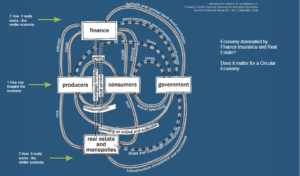
By: Paul Shorthouse, Managing Director, CELC
This month, delegations from nearly 200 countries have been meeting in Dubai for the United Nation’s COP28 Climate Summit, focused on addressing the root causes of human-caused climate change. So far, nearly USD 62 billion has been committed to climate finance, and we’ve seen commitments made through six new COP28 Declarations – including climate and health, sustainable agriculture and resilient food systems, and a coalition for high-ambition, multi-level partnerships.
The ongoing dialogue this month reminds me of an op-ed from a couple of years ago leading up to COP26, co-authored by the World Economic Forum and Circle Economy, entitled “Want to fix the climate, fix the economy”. The article explored the importance of moving to a circular economy to address the climate impacts from our current linear production and consumption practices and supply chains.
Rethinking our Economy to Address the Climate Crisis
How can we potentially redesign our market-based economy in a way so that it doesn’t cause environmental and societal damage, while harnessing the levers of power as forces for good?
An interesting proposition was put forward by Ken Webster, Fellow at Cranfield University and the former Head of Innovation at the Ellen MacArthur Foundation, who spoke at our Canadian Circular Economy Summit this past June. If you missed his thought-provoking Keynote, you can watch it here.
In short, Ken’s argument is that the economy of the future should be one that draws on systems thinking, supporting resource and material circulation rather than extraction, and the economics to support this. But what exactly does he mean by this?

Recognizing that the axis of power in our global economy today lies largely with major multinational corporations, as well as within the real estate and finance sectors, we need to find ways to make the concept of a circular economy more attractive for these actors.
Ken suggests in his keynote that if companies start thinking more about engaging in ‘product as a service’ and ‘materials as a service’ models, our products, materials, and components can be made into asset classes, which then allows the finance and real estate sector actors to get more actively engaged. As a result, he argues, the economy will become more focused on selling less ‘stuff’ and will be able to generate greater profits from the existing materials and resources in circulation.
These models could be applied across all material categories and sectors (as is highlighted in SystemIQ’s report on Everything-as-a-Service), from capital equipment, to vehicles, electronics, and metals and minerals.
However, Ken makes the important point that to really ensure the environmental and social benefits coming from these new economic models are equally distributed amongst society and not just to the players in power, dividends must flow back into the economic cycle.
Materials as a Service Model
In his ‘materials as a service’ example from the mining sector, he suggests for example that source materials could remain the property of the territories where they are mined. Only the right to use the mined resources is sold across the value chain (which in legal terms is referred to as usufruct), generating a continuous revenue stream back to the territory that owns it.

While materials under this model will remain in use for a long time, a small amount of revenues in the form of dividends go back to the territories and the people who mined them in perpetuity while in circulation. Eventually, the resources would go back to their origins to be reproduced and reissued.
While this is not a model we’ll likely shift to overnight, it does prompt further food for thought: Is it one worth exploring, even if only in a few sectors, products, or material streams to begin with? Is it this kind of radical thinking that will be needed to truly address our climate and broader environmental crises? What other models should be considered?
CELC will continue to explore these questions and more in our mission to accelerate a transition to a circular economy in Canada. Interested in joining our cause? Reach out to Paul Shorthouse to learn how to get involved: pshorthouse@circulareconomyleaders.ca
Join our mailing list